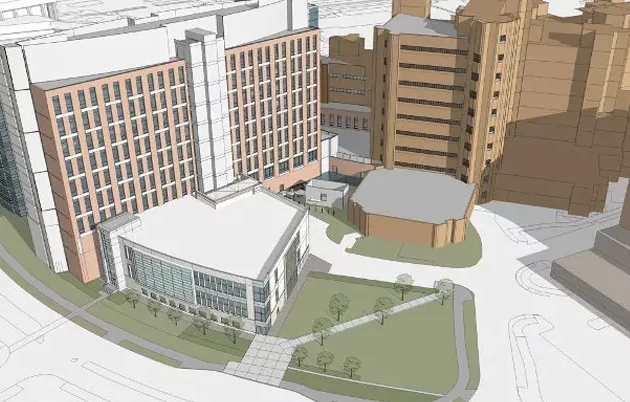The Dr. Bruce and Judith Harms Professorship will be given to a UW surgeon, with preference to faculty in colorectal surgery. Nobody currently holds this professorship, but it may be a useful tool in recruiting a future colorectal surgeon.
“The philanthropy of the Morgridges has had a ripple effect — their gift inspired us to give. I see it as an excellent return on investment,” says Bruce Harms, who earned his MBA from UW–Madison in 2010. “As doctors, and especially surgeons, we tend to think we will live and practice forever. If we wait too long to do estate planning, we might miss opportunities to give something back to UW–Madison. The Morgridges made it possible for other donors to think bigger than they might have otherwise.”
Bruce Harms grew up in rural Deshler, Nebraska (pop. 747), where he attended a one-room elementary school and worked on the family farm. The family grew corn and soybeans, kept a herd of cattle and maintained a fish hatchery.
“We raised fish by the hundreds of thousands,” he recalls. “I ate a lot of catfish and Nebraska beef, and I learned to use a microscope and treat diseases in fish starting in my teen years.”
This upbringing instilled in him a love for biological sciences and fostered his knack for “fixing things.”
Bruce Harms studied biology at the University of Nebraska in Lincoln, and by the time he entered medical school at the University of Nebraska Medical Center, Omaha, he loved everything about the field of medicine. He met his own match in Judith, a critical care and burn unit nurse who grew up in western Nebraska, in the comparatively bustling town of Sidney (pop. 6,757).
The couple moved to Madison in 1977, and Bruce Harms became the first research resident in the SMPH Department of Surgery. He remembers Folkert Belzer, MD, the department chair at the time, as an inspiring mentor who helped solidify his decision to pursue a career in surgery.
Judith and Bruce Harms welcomed their first child, a son, while in Wisconsin. Soon after, they moved to California, where Bruce Harms took a one-year break from his training to complete a research fellowship at the University of California, Davis.
In 1983, the Harms family spent a year in Gloucester, England, where Bruce Harms was a registrar in surgery for the National Health Service and learned about a pioneering procedure in reconstructive surgery — ileal pouch reconstruction — for ulcerative colitis and pre-malignant colorectal diseases.
While in England, Bruce Harms worked long hours, but on his days off, the family traveled as much as possible.
The following year, he became a full-time faculty member in the SMPH Department of Surgery, specializing in colorectal surgery and trauma and critical care surgery. Soon after their return to Wisconsin, Bruce Harms performed the state’s first ileal pouch operation, at UW Hospital (now called University Hospital, part of UW Health).
During the 1980s, he and his colleague established UW Hospital’s reputation for excellence in reconstructive colorectal surgery. He also led the academic medical center’s Trauma Surgery Program for 10 years, and under his direction, UW Hospital attained its first Level 1 Trauma Center designation. Bruce Harms also was the founding faculty member in the Division of Colorectal Surgery, of which he is a member today. That division has grown to include seven faculty members.
On the home front, the couple added a daughter and another son to their family. When the children were young, Judith Harms founded a nursery school and served on its leadership team; she also has dedicated time to the Friends of UW Health, including as its president.
In 2016, Bruce Harms helped launch the Layton Rikkers Surgical Society, named in honor of the chair of the SMPH Department of Surgery from 1996 to 2008. As an alumni organization, the society’s main purposes are to foster relationships and develop programs that improve surgical education.
Bruce Harms shares that he is happy he and his wife put down roots and raised three children in Madison, a city he calls “plenty big.” The couple still has family ties and owns farmland in Nebraska.
Judith Harms notes that while they’ve enjoyed the places they’ve lived and traveled, they hold UW–Madison in high esteem, calling the campus a “phenomenal place that goes above and beyond other universities.”
The couple say they would not be where they are today without Bruce Harms’ opportunities to join the SMPH faculty and practice at UW Health.
Convinced that giving back to the medical profession is the right thing to do, Bruce Harms shares, “If you’re really dedicated to what you’re doing, you’re also training the next generation of surgeons. My younger colleagues in the department are engaged in amazing research. We can all play a part in making sure these talented surgeon-scientists have the funding they need to discover the next big thing.”
He adds, “It’s easy to walk away and say, ‘That was my job. I gave my heart and soul, I got a lot back, and that’s the end.’ But if you look at the big picture, a gift helps plant the seed for the next generation to succeed.”


